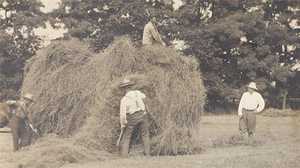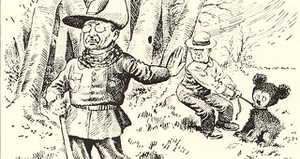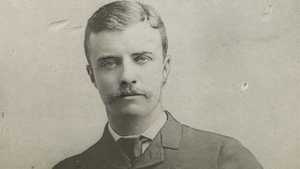David McCullough on TR
Historian and TR Biographer David McCullough discusses Theodore Roosevelt.

TR's Health
He was not expected to live. So that -- that horror, that terror has been implanted in him and when the attack comes, he feels as if he's dying. It's not just excruciatingly painful -- it's terrifying. Now it also gets everybody's attention as nothing else imaginable could do. And asthmatics very often find in later life that they are alleviated by -- or that they need -- attention. They need to be the center of attention. It was once said of Theodore that his problem was he wanted to be the bride at every wedding and the corpse at every funeral. He just adored being in a limelight.
And that's not uncommon among people who have been severely asthmatic as children. There are instances of people who were severely asthmatic returning -- moving away from their homes, coming back to the house that they grew up in, having not been there for many years and having not had an asthmatic attack for many years, and suddenly having an asthmatic seizure ... not because of any pollen or pollutant in the air, but because coming back recalls, brings back all whatever it was about that house, or that childhood that triggered the asthmatic attack.
Now the psychosomatic sides of asthma are real. There are also physiological aspects of asthma which are real. But if one combs through all the possible explanations from a physiological point of view of Theodore Roosevelt's asthma, it's impossible to find any answer. But if you take a look at when his attacks came, it's very interesting, very revealing. And if you look at when the asthma went away, when he -- he overcame this demon, that's very interesting.
It went away when he went away from his family, when he went away from the house on East 20th Street to college, to Harvard. Broke out of that protective swarm of his family, which had given him the confidence, the self-confidence that he so lacked, which had given him the protection and the security, the feeling of security that he so needed as a child and he wouldn't have survived without it, and much that he did later on one can account for because of that secure, strong, safe family life that he was given, that he was blessed to have. But he becomes free of his asthmatic demon when he becomes free to be himself.
The attacks came almost always on Sunday -- the one day of the week his father is home. It's also the day he has to go to church, and if an attack comes, you don't have to go to church. And if an attack comes, your father will scoop you up in his strong arms, carry you out to a waiting carriage and you will dash out of the city, out to the country to spend the whole day in the fields and along rivers or the seashore with your father alone, just the two of you. You have your father's complete attention, complete devotion for a whole day, just you and your father, the man you admire and love more than any other.
Now that is the consequence of an attack. That's what the attack achieves. He doesn't have the attack in order to get that. He isn't planning this, but that is the result. And it has to be considered as an explanation for why the attacks come on Sunday. It also has to be very vivid and all-important explanation of one of the reasons he was devoted, so indebted to his father. And I think it can be fairly said that we, the United States of America, we Americans have in many ways been the beneficiaries of those horrifying, painful, excruciatingly painful, experiences of that little boy, because out of those Sundays with his father came his love of Nature, his love of the outdoors, his love of unspoiled America.
TR's Life in the West
When he went West as a cowboy, he went all stops out. He, had his spurs and his belt buckles and his pearl-handled revolvers all done for him by Tiffany. He had a woman make him a cowboy shirt with fringe and all, a kind of buckskin, Wild West outfit that costs $100. Well, that would be a $1000 or $1500 today. Imagine getting yourself up in a thousand-dollar cowboy shirt. It would be as if he went West all done up by Ralph Lauren.
And he arrived with his, regalia and his very thick eyeglasses and his very thick Harvard accent, and the cowboys just thought that was something they had never seen before, something quite new under the sun. And they would go charging off by horseback on their work, the round-up, or whatever, and he would shout over to them, "Hasten forward quickly there." Well, they'd just about fall out of the saddle, it was so hilarious.
But once again he didn't try to ape their mannerisms. He didn't try to imitate them in order to win them over. He won them over by being himself and by doing what they did, by being just as tough and durable as the situation called for. And gradually this comic character, who they had made such sport of and so ridiculed, became Good Old Four Eyes, lovable, an admired figure, because he could take it.
He's approached in a bar one night by a tough bully and Roosevelt, this rather small man -- you must remember he was only about five-foot-eight-and-half -- stood up and knocked this fellow cold. And they didn't forget that. His endurance on long rides in all seasons of the year was as much as any of them could have hoped for.
TR's Love of the Limelight
To understand anybody, it's very important to understand their childhood, and this is certainly so for Theodore Roosevelt. But what makes it especially so is that the boy Theodore Roosevelt never leaves stage, so to speak. This little boy quality that he had was one of his most salient characteristics when he was in the White House, his whole life.
One of his friends, the English diplomat Cecil Spring Rice, once said, "The thing you have to remember about the President is he's about six." Woodrow Wilson called him a "great big boy". He went off later in life, after leaving the White House, on a very dangerous, very risky adventure in South America, and when they asked him why he was doing it at his age, he said, "It's my last chance to be a boy again."
His empathy, his ability, his genius for being with children, for playing children's games, for telling children's stories, for reading children's stories all is evocative of this boy in him. And I think he understood that if you want to have more fun in life, that was a very good quality to have. He burned bright all the way through and what's so fascinating is to see how he's also aging while this boy in him keeps burning. When he was 48 years old, he describes himself in confidence to a friend as becoming a "decrepit old man". By age 60, he is an old man. He looks old, he acts old, feels old, and yet this light, this hyperactive child is still flaming inside of him.
His desire to be front and centerstage so much, I think, is part of that. He loved it. He loved being the center of attention. When he was shot at by a fanatic in Milwaukee during the 1912 Bull Moose campaign, his life was saved by the fact that he had his eyeglasses case and his folded-up speech inside of his coat pocket. And he was bleeding. It looked as though he were mortally wounded, but he insisted on standing up to finish that speech. I think he really wanted to die giving that speech. What an exit. Nobody would ever forget it. And he knew that. He felt that. He loved it.
Sometimes cabinet meetings had to be called off because the children were banging around upstairs on stilts or whatever. He permitted their calico pony, Algonquin, to be taken into the White House and carried aloft on the White House elevator to visit one of the children who was feeling rather down in the dumps. All the pets, the menagerie, that they were allowed to have in the White House, was also for Father. Father loved them. Father wanted those pets around, the little snake, Emily Spinach, and Jack Dog, the terrier and the rest. And the father would sometimes be late for state banquets because he was upstairs either reading the bedtime story or telling them a tall tale or having a good all-out pillow fight. He was -- he was literally, factually the youngest President in our history.
He took office when he was only 42 years old. But he was a lot younger than that in many other ways, too.
TR's World View
Well, he believed to his boots that virtue and strength were not disjunctive, and it was fine to be good, but it was better to be good and strong, too. And he believed that we should be a strong country and, by that, he meant military strength. He was a great admirer of the writings of Admiral Mahan, who preached the importance of sea power, but, he didn't need a great deal of preaching about that. He felt it anyway. And he wanted a two-ocean navy. He wanted a navy that could come and go to the Pacific or the Atlantic He felt that history had left us no choice -- we had to be a power in the world, we had to be a force in the world, like it or not. And the country better face up to that. And, in keeping with this notion of sea power on both oceans, worldwide, was the dream of a -- an isthmian canal, a Panama Canal, as it became.
Well, by his interpretation of events, the Colombians -- and Panama, of course, then was part of Colombia -- were being extremely high-handed and arbitrary and what right had they to stand in the way of progress? From their point of view, he was being extremely high-handed and arrogant and what right did he have to tell them how to conduct their business? I don't think there's any question that he would not have approached one of the great European powers that way. He wouldn't have dealt as he did with Colombia with, say, Britain or France or Germany. He is showing some of his less attractive sides in this affair and it was unfortunate that he was so impatient. His impatience came to the fore as a great disadvantage in this situation and had he been a little more diplomatic and patient, probably an acceptable agreement could have been worked out with Colombia. Instead, this sort of comic opera, Panama revolution, that took place, which would never had happened without our participation in it -- either direct or oblique -- created the new nation of Panama. We then dealt with Panama instead of having to deal with Colombia, which seemed all very neat and clever but would lead to big problems in time to come.
This is the essence of gunboat diplomacy. Every time one hears of gunboat diplomacy, one can imagine the old cartoons that appeared at the time of the Panama revolution showing the American gunboat, and eventually gunboats, arriving in force to make sure it all came off. It's too bad. It's a shame that our political and diplomatic handling of the situation wasn't as effective, as thoughtful, as professional an understanding of the nature of the terrain as was our engineering in building the canal.
It upset many people in his own administration and he kept trying to justify it, he tried to defend himself, argue what the legality of it was, and finally -- later on -- in a speech he made in California, he said, "I took Panama and let Congress debate that while I went ahead and built the canal." But "I took Panama" is really about as accurate a way to say it as anyone could have and he said it himself.







